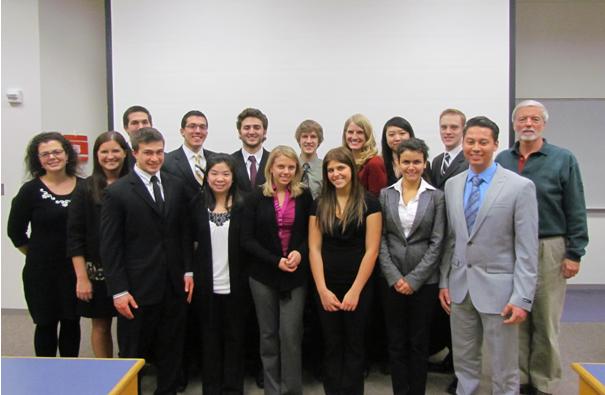
Rebecca Braga, a junior accounting major, has learned the connective power of Oakland University’s School of Business Scholars program.
The program has connected her to people, opportunities and real-world experiences that have already kick-started her career.
Scholars is a three-part program that teaches SBA sophomores, juniors and seniors leadership and analytical skills, and pairs them with a mentor well positioned in the business community.
“Scholars has been a great experience for me,” says Braga, of Shelby Township, Mich. “Not only has it aided me in getting an internship with an accounting firm, but also it has taught me valuable information that I would not have learned in a classroom.”
Therein lies the heart of Scholars, explains Karen Markel, faculty director, strategic initiatives and undergraduate business programs, and associate professor, management. It gives students experiences to be prepared on graduation day to meet the challenges of today’s rapidly changing business environment.
Scholars officially began with a pilot in 2007 thanks to a Chrysler Corporation grant. Since then, the SBA evaluated the program, and remodeled and re-launched it in Fall 2011 incorporating improvements and lessons learned from the pilot. For the re-launch, the SBA recruited 17 students with a 3.4 grade point average or higher to apply for this voluntary series of classes and competitions, which complements the SBA curriculum.
Meeting of the Minds
SBA Scholars meet twice a month during the academic year to participate in leadership classes. The sessions focus on skill development, including time management, presentation, negotiation, conflict management, process management, customer focus, interpersonal savvy and more. They also get valuable time with their assigned mentor.
“I have shared advice on everything from how to team with others effectively to appropriate timing on ‘giving notice’ at work,” says Judy Hegelund, director at Deloitte Services LLP in Detroit. “Our discussions are very fluid and deal with whatever the students are dealing with at that point in time. I let them drive the conversation.”
So, too, does mentor Tony Ostrowski, Finance ’04, accounting services coordinator with U. S. Steel - Great Lakes Works in Ecorse, Mich. “Some of the key lessons I have instilled in them are simple business communication basics, including the importance of public speaking, computer skills ̶ specifically Excel ̶ and email writing,” he says.
On the Case
In creating the new Scholars Program, Markel has made public speaking lessons an avenue to teach analytical skills and teamwork -- keys to succeeding in any setting.
Through Scholars, students compete in three business problem case competitions during the academic year where they are presented a dilemma that a business leader may encounter. Working under a three-hour deadline, each team analyzes the situation and uses their business knowledge to develop realistic recommendations to address the issue. They then present their findings to judges.
Businesses in the community support the education and development of future business leaders by sponsoring the case competitions. This year's sponsors -- PNC Bank (related story) and the OU Branch of MSU Federal Credit Union (related story) (MSUFCU) -- also award the winning team of each case competition with prizes.
Whether or not they take first place, all participants are winners, notes Dan LeClair, executive vice president and chief operating officer of the Association to Advance Collegiate Schools of Business, a nonprofit organization devoted to the advancement of management education.
“Programs like (Scholars) can enhance student learning by making the outcomes of decisions more tangible,” LeClair says. “Team competitions provide opportunities for individuals to lead and to develop vital professional networks.”
Building a Strong Future
It also translates to a better community, believes John M. Savio, vice president, OU Branch of the MSUFCU, and member of SBA’s Board of Visitors. “The credit union supports Scholars because the program helps make a better, more informed, educated student, and that knowledge benefits the entire community.”
Case competitions also help develop superior future employees, believes Michael Bickers, Finance & Accounting ’86, who not only encouraged his company, PNC Bank, to sponsor Scholars but also mentors four students.
“It’s great to work as a team, but you have to hold yourself and your teammates accountable for their roles, which can be hard to learn,” says Bickers, PNC’s executive vice president and retail market manager. “You also learn to push each other to do extraordinary things; and that spills over into everything you do.”
For sophomore William Gross, a finance major, the case competitions have pushed him out of his comfort zone by expanding on his limited public speaking experience.
“This is where my mentor has really helped me,” says Gross of mentor Rande S. Somma, formerly president of Worldwide Automotive Operations at Johnson Controls and now a consultant to CEOs. “He’s given thousands of presentations. He pointed out he’s never not nervous -- but he gets around that by being prepared."
Somma is happy to help. “It’s not enough to prepare students to walk out of school with cognitive intelligence,” he says. “Scholars takes students one step further to help them succeed.”
By Rene Wisely
Rebecca Braga, a junior accounting major, has learned the connective power of Oakland University’s School of Business Scholars program.
The program has connected her to people, opportunities and real-world experiences that have already kick-started her career.
Scholars is a three-part program that teaches SBA sophomores, juniors and seniors leadership and analytical skills, and pairs them with a mentor well positioned in the business community.
“Scholars has been a great experience for me,” says Braga, of Shelby Township, Mich. “Not only has it aided me in getting an internship with an accounting firm, but also it has taught me valuable information that I would not have learned in a classroom.”